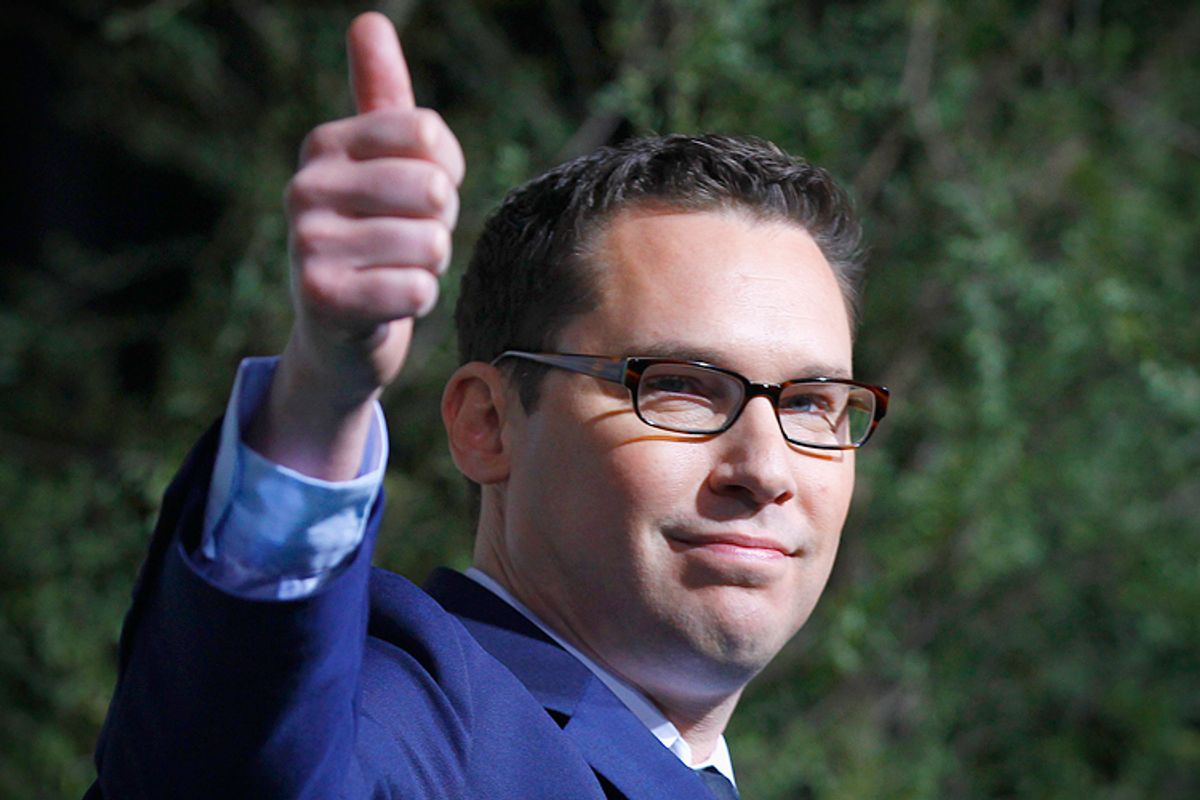The abuse accusations this week against blockbuster writer, director and producer Bryan Singer could be described in many ways. "Drug-fueled underage sex romps" shouldn't be one of them. Nor should "obvious attempt to get publicity."
In a suit seeking unspecified damages filed in a Hawaiian federal court Wednesday, Michael Egan III accused Singer of "battery, assault, intentional infliction of emotional distress and invasion of privacy by unreasonable intrusion." Egan claims that as an aspiring teen model and actor in the late 1990s, he wound up as a frequent guest at "notorious Hollywood parties" that were "typically sordid and featured sexual contact between adult males and the many teenage boys who were present." During one of them, the suit graphically alleges, "Defendant Singer masturbated Plaintiff and then performed oral sex upon him. Defendant Singer solicited Plaintiff to perform oral sex upon him which Plaintiff resisted. Defendant Singer flagrantly disregarded Plaintiff’s unwillingness to submit, and forced Plaintiff’s head underwater to make Plaintiff perform oral sex upon him ... Defendant Singer then forced Plaintiff to continue performing oral sex upon him outside of the pool, and subsequently forcibly sodomized Plaintiff." Though he says he continued to see Singer and was flown out on trips to be with him, Egan claims he never "freely, voluntarily and knowingly consented to these sexual interactions, and often resisted them," and that Singer repeated plied him with drugs and alcohol and a combination of threats and promises regarding his career. The suit also references as a presence during the events Marc Collins-Rector, the former chairman of Digital Entertainment Network. Collins-Rector is now a registered sex offender for crimes involving minors. And as Xeni Jardin points out in Boing Boing Wednesday, Singer has faced somewhat similar allegations in his past, and in roughly the same period. In 1997, a 14-year-old extra on his film "Apt Pupil" filed suit claiming the filmmaker "ordered him and other minors to strip for a scene that was shot in the showers of a school locker room." Entertainment Weekly noted at the time, "All three teenagers are claiming trauma from the experience, charging the filmmakers with, among other things, infliction of emotional distress, negligence, and invasion of privacy."
Egan has requested a trial, and should it get to that point it will be up to a jury to determine the veracity of his claims. But in the meantime, it'd be super if tabloids like the New York Daily News wouldn't refer to what Egan's suit calls "anal rape" as "romps." (See also: The alarming amount of the reporting around the Penn State story that used sexual abuse and "sex scandal" interchangeably.) And though Singer has every right to defend himself against serious, potentially life-ruining charges and to have his attorneys declare that "We are very confident that Bryan will be vindicated," is it really necessary or helpful to the cause to add that "It is obvious that this case was filed in an attempt to get publicity at the time when Bryan's new movie is about to open in a few weeks"? By turning Egan's claims into a public accusation of gold-digging, the message is clear: A man who says he's been abused is in it for the shakedown.
The way we talk about abuse and claims of abuse is still incredibly clumsy – especially when the topic involves men and boys. A new study released this week on "The Sexual Victimization of Men in America" for the American Journal of Public Health notes that "Popular media reflects insensitivity, if not callousness, toward male victims ... Criminal prosecution for the sexual victimization of men remains rare and has been attributed to the lack of concern for male victims." So let's do a little better, for everybody's sake. We can aim to be fair and impartial regarding the specifics of a case while not conflating claims of rape with romps, and we can remember that the sexual abuse of men and boys is real, and that the subject merits sensitivity. How we address these things matters -- and not just to the parties directly involved.

Shares